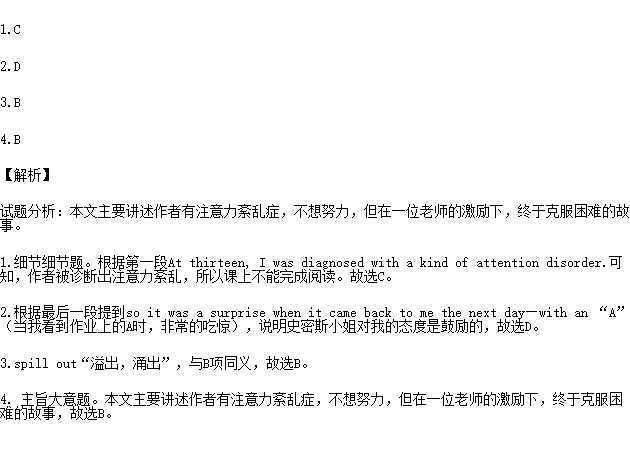题目内容
At thirteen, I was diagnosed(诊断) with a kind of attention disorder. It made school difficult for me. When everyone else in the class was focusing on tasks, I could not.
In my first literature class, Mrs. Smith asked us to read a story and then write on it, all within 45 minutes. I raised my hand right away and said, “Mrs. Smith, you see, the doctor said I have attention problems. I might not be able to do it.” She glanced down at me through her glasses, “You are no different from your classmates, young man.”
I tried, but I didn’t finish the reading when the bell rang. I had to take it home.
In the quietness of my bedroom, the story suddenly all became clear to me. It was about a blind person, Louis Braille. He lived in a time when the blind couldn’t get much education. But Louis didn’t give up. Instead, he invented a reading system of raised dots(点), which opened up a whole new world of knowledge to the blind.
Wasn’t I the “blind” in my class, being made to learn like the “sighted” students? My thoughts spilled out and my pen started to dance. I completed the task within 40 minutes. Indeed, I was no different from others; I just needed a quieter place. If Louis could find his way out of his problems, why should I ever give up?
I didn’t expect anything when I handed in my paper to Mrs.Smith, so it was quite a surprise when it came back to me the next day—with an “A” on it. At the bottom of the paper were these words: “See what you can do when you keep trying?”
1.The author didn’t finish the reading in class because ________.
A. he wanted to take the task home
B. he was new to the class
C. he had an attention disorder
D. he was tired of literature
2.What was Mrs. Smith’s attitude to the author at the end of the story?
A. Angry.B. Impatient.C. Sympathetic.D. Encouraging.
3.The underlined phrase spilled out in Paragraph 5 probably means ________.
A. put inB. crowded inC. cheated inD. broke in
4.What is the main idea of the passage?
A. A teacher can open up a new world to students.
B. One can find his way out of difficulties with efforts.
C. The disabled should be treated with respect.
D. Everyone needs a hand when faced with challenges.


